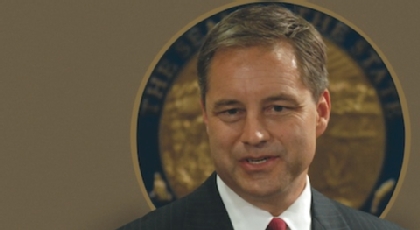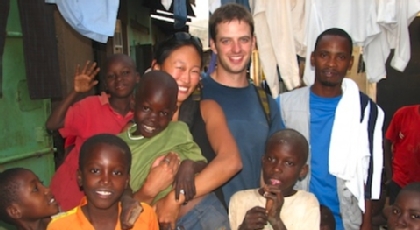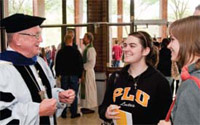Page 162 • (1,655 results in 0.076 seconds)
-
Originally published in 2005 For two weeks of March, 2000, in the vast jungle along Mexico’s southern border with Belize, I joined a team of biologists and hounds in chasing and capturing a wild jaguar. I was in Mexico as a Fulbright Scholar. It took…
touching this jaguar was the experience of a lifetime. Since returning to the United States, I often find myself evoking this deeply satisfying moment, when the value of a life was contained in a touch. And I find myself wondering what happens to this sense of the presence of animals, this moment of contact with other creatures, inside the academy. The touching of the jaguar in the Mexican jungle dramatizes for me the absence of the animal as an animal in our universities. Despite important pockets of
-
Originally published in 1999 My lifelong commitment to the liberal arts took root in the fourth grade, when I met my classmate and dear life-long friend Sally. During that entire year, Sally rode her bike to my house, and after school, we both rode our…
training and education in the professions which modern society requires” [my italics]?To date, we have begun discussions about new programs in which courses offered by faculty in the professional schools would be combined with courses traditionally offered by faculty in the College of Arts and Sciences. Professors in the professional schools are also being drawn into foundational courses, such as the Freshman experience. Potential cross-disciplinary programs that result from such creative overlaps are
-

Walk across campus and you can see the effects of the COVID-19 pandemic everywhere. Masks on faces, signs reminding you to wash your hands, restrictions on classrooms and more. But the pandemic hasn’t just caused physical changes, but also unexpected mental challenges. And that is…
streamline this messaging and provide clarity to the student body, a group of PLU students — representing the Phi Alpha Honor Society in Social Work, Psi Chi Honor Society in Psychology, and the Psychology Club — put their heads together to come up with a way to get these resources into the hands of those who need it. “The majority of my college experience has been online,” said Beck. “We looked at the outcomes of (the pandemic) and the effects it has had on our mental health and thought, ‘how can we
-
Walk across campus and you can see the effects of the COVID-19 pandemic everywhere. Masks on faces, signs reminding you to wash your hands, restrictions on classrooms and more. But the pandemic hasn’t just caused physical changes, but also unexpected mental challenges. And that is…
Club president. In an effort to streamline this messaging and provide clarity to the student body, a group of PLU students — representing the Phi Alpha Honor Society in Social Work, Psi Chi Honor Society in Psychology, and the Psychology Club — put their heads together to come up with a way to get these resources into the hands of those who need it. “The majority of my college experience has been online,” said Beck. “We looked at the outcomes of (the pandemic) and the effects it has had on our
-
Tutoring program touches refugees The makeshift classroom buzzed with life as dozens of Somali Bantu children worked with PLU student-volunteers to solve math problems, sound out words and learn their colors. Jessica Baumer ’09 tried to get 13-year-old Murjan Jatar to focus on completing his…
find Washington state and Tacoma. The children have all been in the United States for various stretches of time, from less than a year to more than three years. Some were originally resettled in Tacoma, while others were invited to move by Bantu families already in Tacoma. Those families came from Texas, Utah and even New York as part of a “second migration,” Fisher said. Despite the tutoring obstacles, the experience has been extremely rewarding, Baumer said. The younger children are adorable and
-

Back to Normal By Barbara Clements A sense of relief. That seems to be the common reaction from cab drivers, shop keepers, bureaucrats and baristas around Anchorage when Gov. Sean Parnell’s name comes up. It has been a tumultuous two years for Alaska. Its new…
often overbooked, with patients waiting for care. They plan to expand, but may need a few million if a grant doesn’t pan out. They look expectantly at Parnell, who remains pleasant, but noncommittal. “Budget time,” he smiles as he climbs back in the SUV that seems to be the favored mode of transportation in this state. Then it’s off to the airport and a flight to Juneau to meet with lawmakers later that night. It’s going to be another long day. Read Previous A ‘Twilight’ experience Read Next LEED
-

A leap of faith: one Lute finds that one person can make a difference By Barbara Clements Matt Kennedy ’07 sat in front of his computer screen and tried not to hyperventilate. On one side of the screen was his bank account, on the other…
for his Uganda experience. But again, he was wrong. The idea of capitalizing on another tournament just wouldn’t stop tapping at his mind. But he was home now, in Puyallup in 2009 and unemployed, living off food stamps. The idea of returning to Uganda seemed an unattainable dream. Then, he scored a landscaping job. He moved in with Mom and decided to try and save 90 percent of his earnings. His grandmother sold her house and gave him $2000 of the proceeds. After months of work in 2009, he was
-
http://www.youtube.com/watch?v=jmbzzLNVje0 Three PLU MediaLab students went from Canada to the Gulf to explore the issue of oil for their documentary “Oil Literacy.” Understanding oil By Chris Albert This past summer, students from PLU’s MediaLab embarked on a journey to learn, ask and explore oil and…
. “What the most powerful for me was seeing all the different cultures within our own country,” Rodriguez said. “Seeing where people are from and how that shapes their views on the issues was very powerful to me.” Through this experience, the students’ own views begun to take shape. For example, they don’t buy and use plastic water bottles now. “It’s amazing how much oil is used in the production of plastic water bottles,” Plog said. “It just takes something small to make a big difference.” According
-

Consolidating our strengths and addressing new challenges PLU President Loren J. Anderson greets students during opening convocation. He believes the next few years will be critical as PLU plans for its future. By Loren J. Anderson – PLU President The public announcement last month of…
traditional age students will not change dramatically, but their composition will, as the new cohort becomes more diverse in learning experience and style, in their economic situation, in their ethnic heritage and in their educational expectations. I believe that both more non-traditional age students and more first generation students are headed our way. The implications for the schedule and the calendar, as well as the campus and the classroom, are many fold. Second, the wise and effective use of
-
Stories of real people give a face to atrocities As Noemi Schoenberger Ban looked at her mother, one last time, the message was clear, Ban recalled. “Her eyes told me to take care of myself,” Ban said. And then her mother, baby brother and younger…
years. The village, largely comprised of French Huguenots, banded together to feed, hide and shelter the Jews that came singly and by groups into the village. On Friday, Wilkens shared his experience during the Rwandan genocide. Even though scholars study the Holocaust and unbelievable numbers surround the murdered, it is the stories of the people that make it real. “I promised them when I came back to America I would share their story,” Wilkens told the crowd. “Nothing compares to stories.” During
Do you have any feedback for us? If so, feel free to use our Feedback Form.


